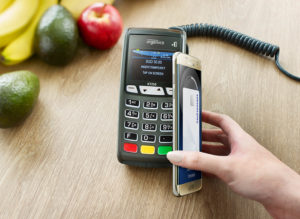NOTICE: This post references card features that have changed, expired, or are not currently available
Last week, I argued that the main reason to get the US Bank Altitude Reserve card is for the signup bonus. I argued that the card didn’t make sense for most people to keep beyond the first year. It certainly isn’t the one perfect card, and you’ll most likely get quickly shut down if you try to use it manufacture spend.
That said, I do think there are reasons for some to get and to keep this card as a secondary card…
Low cost, for many
If you tend to spend a fair amount each year on travel expenses, then the net cost of keeping this card is low. Yes, there’s a $400 annual fee, but US Bank will also reimburse $325 in travel expenses each membership year. For those who spend regularly on travel, this brings the effective annual fee down to only $75. That’s not bad.
Big rewards possible through mobile wallet 3X

If you often pay for travel, you can certainly do well with the Altitude Reserve (which offers 3X for travel and mobile wallet purchases), but I’d argue that you could do better with a card like the Chase Sapphire Reserve, or Citi Premier, or Citi Prestige.
I think that the reason for some to get and keep the Altitude Reserve is that it offers 3X for mobile wallet purchases.
As more and more merchants accept mobile wallet payments, the Altitude Reserve will become more and more of a “3X everywhere” card. There are other great cards that can be used for everyday non-bonused spend, but they top out at about 3% in rewards (see: Best rewards for everyday spend). If you plan to use the Altitude Reserve points for travel, then the card’s 3X categories effectively offer a 4.5% rebate (since points are worth 1.5 cents each towards travel).
There are many types of mobile wallet purchases in which the best alternative in your wallet is likely to offer no more than 3% in rewards. And, for many, the best alternative may be closer to 2%, depending upon which cards you carry. But, even when the best alternative is 3%, the Altitude Reserve promises 1.5% better returns.
Break even points
How much would you have to spend on mobile wallet purchases that do not fit into any category bonuses in order to cover the card’s $75 annual fee ($400 – $325 in travel credits)? The answer depends upon your best alternative*:
- Compared to a 3% card, you would have to spend $5000 per year on mobile wallet purchases to break even.
- Compared to a 2.5% card, you would have to spend $3,750 per year on mobile wallet purchases to break even.
- Compared to a 2% card, you would have to spend $3,000 per year on mobile wallet purchases to break even.
Viewed weekly, we get the following:
- Compared to a 3% card, you would have to spend $96 per week on mobile wallet purchases to break even.
- Compared to a 2.5% card, you would have to spend $72 per week on mobile wallet purchases to break even.
- Compared to a 2% card, you would have to spend $58 per week on mobile wallet purchases to break even.
From that point of view, the card seems like a no-brainer. It should be easy to reach those spend amounts, right? Not so fast…
* The numbers presented here assume that the best alternative card has no annual fee.
You should do more than break even
If the best you can do is break even, then there’s no point in bothering with this card. The goal should be to earn significantly greater rewards, especially since the result is not cash back, but points that can be used for limited types of travel. The Bureau of Transportation’s US airfare statistics show that the average fare in 2016 was $349 (down from $382 the year before). So, let’s round up one dollar and somewhat arbitrarily say that our goal is to earn at least one round trip flight each year through the extra value given by this card over your best alternative. In other words, at 4.5% in travel rewards, we want to be able to cover both the effective $75 annual fee and a $350 flight with the extra rewards earned compared to competing cards.
Here then, are the target spend amounts in order to earn “significantly more rewards” (cover the annual fee plus $350 in travel):
- Compared to a 3% card, you would have to spend $28,333 per year on mobile wallet purchases to earn significantly more rewards.
- Compared to a 2.5% card, you would have to spend $21,250 per year on mobile wallet purchases to earn significantly more rewards.
- Compared to a 2% card, you would have to spend $17,000 per year on mobile wallet purchases to earn significantly more rewards.
Wow, those are big numbers. Let’s convert them to per-week amounts in order to get a sense of what your weekly expenses would have to be to make this card worthwhile in the long run:
- Compared to a 3% card, you would have to spend $545 per week on mobile wallet purchases to earn significantly more rewards.
- Compared to a 2.5% card, you would have to spend $409 per week on mobile wallet purchases to earn significantly more rewards.
- Compared to a 2% card, you would have to spend $327 per week on mobile wallet purchases to earn significantly more rewards.
These are still big numbers, but maybe not crazy big. While I wouldn’t come close to those numbers without a bit of manufactured spend, I expect that many readers have spending patterns that would fit and where mobile wallet payments are accepted (or will be accepted sometime in the near future).
Using points
To get 1.5 cents value from each Altitude Reserve point, you have to book flights, hotels, or car rentals through the US Bank online rewards portal. If past experience with US Bank’s FlexPerks program is any guide, you can expect the following:
Flights: Not all flights of interest will be available online. Most will price correctly when present, but there will be exceptions. You can call to book flights that are not bookable online or to argue for competitive price. When flights are booked through this portal, you can add your frequent flyer number to the reservation. That way, you will earn miles and will be recognized for your elite status (if any).
Hotels: Hotel search results will be similar to that from other online travel agencies (e.g. Expedia, Orbitz, Hotels.com, etc.). Prices will vary tremendously when compared to other sites. If you can’t find the best price through the US Bank portal, you probably shouldn’t use your points for that trip. Unlike flights, you cannot call to book hotels or car rentals. When you book hotels through online travel agencies like this you won’t usually earn hotel points and your elite status usually won’t be recognized.
Car Rentals: As with hotels, search results will be similar to that from other online travel agencies (e.g. Expedia, Orbitz, Hotels.com, etc.). Prices will vary tremendously when compared to other sites. Unlike with hotels, there’s a pretty good chance here of getting very good prices. If you can’t find the best price through the US Bank portal, you probably shouldn’t use your points for this rental. Unlike flights, you cannot call to book hotels or car rentals. When you book cars through online travel agencies like this you won’t usually earn car rental rewards and your elite status usually won’t be recognized.
As you can see above, there are significant downsides to paying for travel with points. Personally, I’d use points primarily to pay for flights, but only when I can find the same best price available elsewhere. Oh, and I might use points to pay for car rentals when the website finds particularly good deals.
Conclusion
If you spend heavily in the Altitude Reserve’s 3X categories (travel and mobile wallet purchases), the card may very well be worth keeping beyond the first year especially if you plan to use points to purchase travel. Keep in mind, though, that you might not always get the best deal when booking travel through the US Bank website, and that with hotels and car rentals you won’t earn points and your elite status won’t be recognized.




I know the annual fee is $400, but I bought a travel ticket of $300, I got it reimbursed but in the end, the total was still $400, in this case I thought it would be $100 for the statement credit? Thanks.
The travel credit reimburses travel not the annual fee, so it sounds correct what happened.
I wish you would say more about how or under which circumstances we’ll be able to earn e.g. Hertz points while redeeming Altitude or flexpoints. I was never approved for the FlexPoints card, so I don’t have any experience with that. One of my favorite things about rentals is being able to leverage rentals into lots of UA or SW miles, it would suck to be able to get no points from a rental, even rental company points. Obviously it’s still a good deal, but it does affect one’s calculations.
You cannot earn rewards when using Altitude points to book car rentals or hotels. With airfare, though, you do earn miles with the airline. That’s why I believe that airfare is the best use of these points.
[…] There is a reason to get and keep the Altitude Reserve card […]
[…] a new credit card out (maybe you’ve heard about it ), and Joe has an alternative view on Premium Travel […]
[…] may be living on a limited amount of time and this morning he wrote about why it might make sense to get and keep a US Bank Altitude Reserve card. Of course, the biggest reason in my book to get and keep it is for 3X mobile payments — a […]
Can you book Air Tahiti flights through their portal? PPT-BOB
I don’t know
This is not my first choice. But I may throw in with other apps but due to almost zero way to meet all the high spend req to get the bonus I can’t apply. So sad what has become now
Can you book cruises on USBANK for 1.5? I cannot not find the answer to this. If anyone knows, thank you in advance. Happy Cinco De Mayo 5/5/17 everyone.
No, you can’t. I believe that’s in our Complete Guide. You can only book flights, hotels, and car rentals.
I was planning on buying some gift cards with mobile to hit the $4500 spend. What is US Bank’s appetite for limited MS? (Maybe single $300 or $400 gift cards a few times during the first 3 months mixed in with regular spend?)
I wish I knew! I’d really like to buy some Gift of College gcs at Toys R Us via Apple Pay…
Are you planning to buy this at a grocery store ? My grocery store allows me to use a credit card to purchase a $500 variable vgc.
You didn’t mention one of the biggest reasons to get/keep the card. The annual GoGo wifi passes. If you fly, it in essence will save more than the $75 you will spend on the annual fee.
Right, but don’t forget that the FlexPerks Visa offers that same perk for a much lower annual fee
Tim is correct that it wipes those number down if you are like me and would likely pay for those passes. It at least take down the annual fee issue a bit in my mind as I view it like the travel credit.
Yep, I agree. My point is that you shouldn’t value that benefit more than $49 since that’s the annual fee for the FlexPerks Visa which offers the same 12 wifi passes
If I don’t have enough points to pay for my full flight can I use all points I have remaining and charge the balance to my Altitude card?
Yes, it works that way for flights but not for hotels or car rentals. With the latter, I believe that you must pay fully with points
I just got approved for Altitude card and it’s already in my profile. There is an interesting quirk when it comes to flight redemptions. It appears that you DO need to have enough points to cover the first ticket completely. Probably because they use the same reservation system as Flexperks.
Here are the terms that I copied from the website:
“When redeeming points for air tickets, the first ticket must be covered in full by redeeming with points before any additional tickets can be purchased. If you do not have enough points for a single or multiple tickets, you have two options:
Option 1- Purchase additional tickets in full by paying for them on your Rewards credit card
Option 2 – Purchase additional points to be used to redeem for the additional tickets by calling 844-357-2015.
Hotel and car reservations must be redeemed in full with points, or can be paid in full by using your Rewards credit card.”